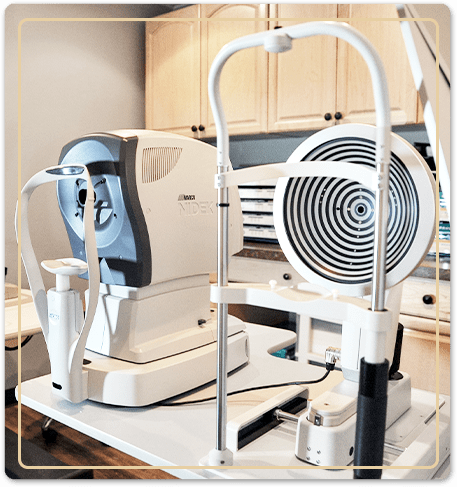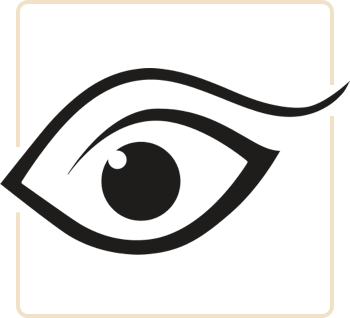Our Focus Is Your Vision & Eye Health
You might not think of it often, but managing your eye health is a lifelong responsibility.
Many eye diseases and conditions can develop with little to no noticeable symptoms during their early stages, and by the time you realize there is a problem, the effect these issues can have on your sight may be permanent. The best way to protect your eyes from these concerns is to have regular comprehensive eye exams.
At Annapolis Vision Center, our diagnostic technologies help us get a detailed picture of your eyes, and we’re ready to provide unique strategies to keep your vision clear and healthy. Book your appointment today.



Eye Exams: An Essential Step
for Protecting Your Sight
The path to total vision care starts with regular eye exams.
Eye exams don’t just help us update your lens prescription; they’re essential for managing your eye health and preserving your vision from various eye diseases and conditions. We’ll take a detailed look at the structures that support your vision during your eye exam and determine your risk of developing potential issues that may affect your sight.
We’ll search for issues like dry eye disease, glaucoma, age-related macular degeneration, cataracts, and any other concern you may risk developing using our selection of diagnostic techniques and technologies.

Modern Diagnostic Technologies
Our commitment to investing in and using a wide array of tools and technologies helps us understand your eye health and how we can support it.
We may use a combination of these devices during your eye exam, depending on your eye health. If we discover an issue developing, we’ll get to work on tailoring a treatment or strategy to meet your needs.
Ultra-Widefield Fundus Photography
Ultra-widefield fundus photography helps us take high-definition colored images of the area that makes up the back of the eye. From these images, we can examine your:
Ultra-widefield fundus photography can help us detect signs of glaucoma, age-related macular degeneration, and diabetic eye disease.
Optical Coherence Tomography
Optical coherence tomography (OCT) is a unique imaging device that helps us capture cross-sectional images of your retina, optic disc, and macula.
The process is similar to an ultrasound and can help us detect signs of glaucoma, age-related macular degeneration, and diabetic eye disease.
Tonometry
Tonometry is a technique we use to measure your eye’s internal pressure levels, also known as intraocular pressure or IOP. Measuring your IOP can help us detect early signs of glaucoma.
We use 2 different tonometry techniques at Annapolis Vision Center:
The Goldmann applanation tonometer determines your IOP by gently pressing a probe against the surface of your eye and measuring the resistance. The non-contact tonometer measures your IOP by using a small puff of air against your eye’s surface.
Corneal Topography
Corneal topography is an imaging technique we use to map out your cornea (the front surface of your eye). We’ll often use our corneal topographer to help fit you for contact lenses, but it can also help us look for issues like keratoconus.
Meibography
Meibography is an imaging technique we use to examine your meibomian glands. These tiny glands line the edges of your eyelids and produce the oil content used to keep your tears from evaporating too quickly.
Meibography is commonly used to determine the cause of dry eye disease and see how meibomian gland dysfunction may affect your eye comfort.
Biometry
Biometry is a test we may perform to measure the length of the eye. This technique can help us detect myopia progression, but it can also help us detect signs of presbyopia and cataracts.
Cataracts
Many adults can develop cataracts as they age, but we can help address this issue when you come in for an eye exam.
Cataracts develop when proteins in your eye’s natural lens break down as you age. As this happens, your lens can develop a hazy, milky appearance that could affect your vision quality. In advanced cases, it could cause blindness, but cataract surgery can remove the hazy lens and replace it with a clear artificial lens to restore your vision.
We can help correct early cataract-related vision impairment with glasses or contact lenses.
Age-Related Macular Degeneration
Age-related macular degeneration (AMD) is a leading cause of vision loss in adults 55 and older.
This disease affects a part of your retina called the macula. The macula is responsible for providing the central vision you use to read and see fine details, but AMD can cause problems to this area of your vision and could lead to permanent vision loss.
There are 2 types of AMD:
Dry AMD
Dry AMD develops when tiny deposits of fats and proteins, called drusen, begin to form underneath your macula. The drusen can slowly thin your macula over time, eventually leading to vision loss.
Dry AMD is the most common version of the disease, and your risk of developing it can increase if you smoke, have heart disease, or have a family history of the disease.
Wet AMD
Wet AMD is less common than dry AMD, but it’s responsible for almost 90% of all AMD-related vision loss.
This disease can occur when small abnormal blood vessels form underneath your macula. These vessels can break and leak fluids, causing your macula to swell. Symptoms can develop suddenly, so please visit us for an emergency eye exam if you start to develop rapid symptoms like blurry central vision or vision loss.
You may risk developing wet AMD if you already have dry AMD.
Dry Eye Disease
Dry eye disease occurs when your eyes aren’t producing enough tears or the tears you’re producing are of poor quality. Dry eyes can be caused by a number of internal or external factors and, if left untreated, can lead to inflammation, eye infection, and damage to the surface of your eye.
Symptoms you may experience if you have dry eye disease include a burning sensation, redness, blurred vision, and excessive eye-watering. The good news is Annapolis Vision Center offers dry eye therapy to help alleviate your uncomfortable symptoms.
We’ll accurately assess your eyes to determine the cause of your dry eyes and develop a personalized treatment plan right for you.
Glaucoma
Glaucoma is a group of eye diseases that can affect your optic nerve. We can detect glaucoma by examining your optic nerve or measuring intraocular pressure (IOP) during an eye exam.
The risk of developing glaucoma can increase with age, but you may also have a higher risk of developing it if you have a family history of the disease.
The 3 most common types of glaucoma include:
Open-Angle Glaucoma
Open-angle glaucoma is the most common version of the disease. It can develop when blockages form in your eye’s natural drainage system, raising your IOP levels over time.
High IOP levels can indicate potential damage to your optic disc, which could cause vision loss. Open-angle glaucoma develops slowly, and you might not experience any symptoms until it has already permanently affected your vision.
Angle-Closure Glaucoma
Angle-closure glaucoma, or closed-angle glaucoma, is a version of the disease that could develop rapidly and cause emergency symptoms like sudden vision loss, nausea, and eye pain.
It can occur when the drainage canal between your iris and cornea closes or becomes blocked, causing your IOP levels to rise rapidly. If you risk developing glaucoma and experience sudden vision and eye problems, please get in touch with us for an emergency appointment.
Normal-Tension Glaucoma
Normal-tension glaucoma is a unique version of the disease that can develop even when your IOP levels are within normal or expected levels.
Doctors aren’t certain how this disease develops, but our team can help detect it by observing your optic nerve during an eye exam.
Diabetic Eye Disease
Diabetes increases the risk of several eye diseases, with diabetic retinopathy and diabetic macular edema being among the most common.
If you have diabetes, make sure you have regular eye exams to help detect these issues and preserve your vision. Please visit our Diabetic Eye Exams page to learn more about these diseases and what you can expect from your appointment.
Common Eye Diseases & Conditions
The treatments we may recommend differ depending on the person and the issue. In some cases, we may prescribe medications like eye drops to manage issues like glaucoma, or we may recommend procedures like cataract surgery to help restore your vision from cataracts.
Aging, health, and genetics could all increase the risk of developing an eye disease or condition. However, the best way to determine your risk and manage your eye health is to make sure you have regular eye exams.

See Deeper into Your Eye Health
Supporting your vision is a lifelong responsibility, but our team is here to help you manage your sight.
Get started by booking your appointment with the team at Annapolis Vision Center today.
Our Services

Comprehensive Eye Exams

Dry Eye Therapy

Contact Lens Fittings

Myopia Management


Our Location
Find us right off Riva Road at Holiday Court in the Parole Professional Center.
If you have any trouble finding us, please give us a call!

Contact Us
- Phone: 410-266-0099
- Email: [email protected]
Our Address
- 130 Holiday Court, Suite 109 & 111
- Annapolis, MD 21401
Office Hours
- Monday: 9:00 AM – 7:00 PM
- Tuesday: 8:00 AM – 6:00 PM
- Wednesday: 9:00 AM – 7:00 PM
- Thursday: 8:00 AM – 6:00 PM
- Friday: 9:00 AM – 1:00 PM
- Saturday: Closed
- Sunday: Closed
Our Brands







